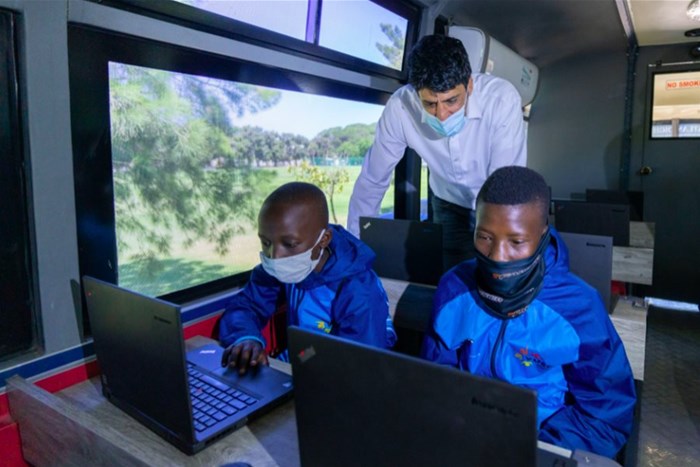FUTURE CAPE TOWN | Thinking about the future of Langa train station
“the private and public
investment in the Langa Station precinct denotes an appetite for broad,
inclusive development within the community”


During a drive through Langa on a
weekend afternoon, one notices the bustling centre of the community; the
taxi rank surrounded by informal traders, butchers, car-washers and
other services. Driving about 1 km further along Washington Street the
newly upgraded Langa Station and Langa Junction
emerges. Both of these transit nodes have the potential to become the
central hub of the community, one a social hub while the other a transit
hub. One idea may be to consider incorporating the taxi rank in the
future development of Langa Station in order to create better
coordination between these two major transport nodes of Langa and
surrounds.
Langa,
situated some 12 km outside of Cape Town city centre, was established
in 1927 as an area designated for Black South Africans to reside in
accordance with the 1923 Urban Areas Act. Langa is the oldest of such
areas and it was the ground of much resistance to apartheid. Currently
Langa is a vibrant community made of 52 000 residents, where the
majority is still black South Africans. While much has improved in the
neighbourhood, Langa still experiences periods of violence in protest against government service delivery, specifically that of housing and the general living conditions.
A great number of spatial
opportunities exist within and around Langa, which is strategically
located adjacent to the closed-down Athlone Power Station now identified as a “future high order mixed-use precinct” according to the City of Cape Town.
There have been many plans for the immediate future such as high
density housing, additional rental accommodation and hostels, public
space upgrades and a non-motorised transport route linking Langa to
surrounding major roads.
The Langa train station forms part of
the Central Line rail service operated by Metrorail Western Cape and is
one of the busiest as the Central Line services operate along two
routes from Central Cape Town to Langa, and then branching from Langa to
various areas in the south-east of the city such as Mitchell’s Plain,
Khayelitsha and Belhar. The station is situated on the outskirts of the
residential area of Langa and South of Epping industrial area. A future
road is being planned just North of the Langa train station which will
house the extension of the MyCiti Bus Rapid Transport system and further
mixed use development in the area.
In March 2015 the Langa Junction shopping mall opened its doors to Langa residents and the 45 000 daily commuters
who use the adjacent Langa station which is conveniently linked to
Epping industrial area via an overhead commuter footbridge. Langa
Junction is the first convenience shopping centre for Langa and Krsip
Properties hope that the centre will become a hub for public transport
commuters as Langa Junction complements the upgraded modern Langa
Station.

About transit oriented development
Car dependency is an increasing
pattern in South African cities and the spatial patterns of the Cape
Town region that emerged during the apartheid era continue to exist in
the accommodation of low density communities on the fringes of the city
who are dependent on public transport.
The concept of Transport Oriented
Development (TOD) offers a means to the restructuring of Cape Town’s
socio-spatial patterns. This has been absorbed into plans and policies
within the province and the country as the 2011 National Development
Plan calls for “the internationally accepted principles” of TOD to be
employed. The notion behind supporting TOD in Cape Town is to create a
more viable and efficient transport system where passengers can live and
work in close proximity to trunk routes and therefore lead to increased
density along these routes with the correct mix of residential and
commercial.
The City of Cape Town is “committed
to building an inclusive city where the future of our residents is not
defined by where they live, but rather where everyone has the
opportunity to unlock and cultivate their full potential” explains
Councillor Brett Herron, the City of Cape Town’s Mayoral Committee
Member, in the division of Transport for Cape Town. Transit-oriented
development has been emphasises in Cape Town “to ensure that we bring
our residents closer to their workplace and that we improve the access
to and efficiency of public transport across the city”.
Between formal and informal
Along with the development of the Langa Junction mall, the local government of Cape Town, has requested that an Informal Trading Plan be developed for the Langa station
southern area from the station extending to Washington Street. The
hopes are to provide a well-managed environment for informal traders to
operate and develop their businesses in a manner that ensures a positive
relationship with the formal trading sector and the surrounding
community. Langa has a vibrant sector of informal trading and the City’s
plan to integrate the informal traders into new development within
Langa will hopefully further support these traders and protect their
business against emerging supermarkets within the area, which serve a
different role to the informal trader.
(Read the plan here)
Councillor Sicelo Mxolose explains
how this inclusion of informal trading “came at a good time when the
community was in dire need for such development. It unlocked the
economic potential of our area and has provided some opportunities for
small informal business people to own or lease formal structures to
conduct their trading”. Councillor Mxolose views the development around
Langa Junction in a positive light as it “provided a number of job
opportunities for our youth” and will continue to provided further
business and trading opportunities to aspiring young entrepreneurs in
the community.

What this precinct could become?
Upon first visiting Langa it may seem
as though the development of Langa Junction, whose aim is to create a
transport and shopping hub within Langa, has not taken into
consideration the already entrenched hub of activity which exists around
the taxi rank of Langa, 1km away from the train station.
Councillor Johan van der Merwe, a
Mayoral Committee Member for Energy, Environmental and Spatial Planning
for the City of Cape Town, does not “foresee that the two potential hubs
could create tension within the community. Each transit stop creates
its own economic opportunities and the nature of the formal activity is
determined to some extent by the land ownership and available land in
the vicinity. The extent of Langa means that it benefits from having two
transport interchanges and good accessibility to two different modes”.
Councillor van der Merwe explains how
Langa Junction spawned “out of the private sector recognising a
transit-oriented retail opportunity, made possible by land owned by a
state-owned entity being available for development”. The development,
therefore, is not a representation of a bigger plan for Langa but is
rather supporting the City’s Transit-Oriented Development agenda and the
overdue need to invest in historically disadvantaged areas in and
around Cape Town.
The future development of Langa is a
bright one as Councillor van der Merwe states that “the City believes
that the private and public investment in the Langa Station precinct is
positive, and denotes an appetite for broad, inclusive development
within the community”.
Read more






